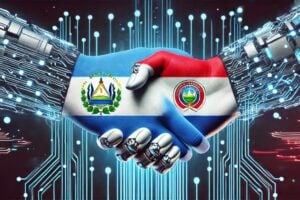El Salvador and Paraguay have signed a Memorandum of Understanding (MOU) to strengthen cooperation in the regulation of cryptocurrencies.
This agreement marks the second regulatory commitment of El Salvador in less than three months, following the agreement with Argentina in December.
El Salvador x Paraguay: a new step in the regulation of cryptocurrencies
Last Friday, the Secretaría de Prevención de Lavado de Dinero o Bienes (SEPRELAD) of Paraguay and the Comisión Nacional de Activos Digitales (CNAD) of El Salvador officially announced the agreement.
The collaboration aims to improve the supervision of the crypto sector, to strengthen anti-money laundering practices, and to identify unauthorized operations in Paraguay, stated SEPRELAD on its website.
Juan Carlos Reyes, president of the CNAD, emphasized the importance of the agreement on X (formerly Twitter), stating that El Salvador continues to share its experience in the field of digital assets to build a more transparent and interconnected future.
The role of El Salvador in the global regulation of cryptocurrencies
El Salvador has one of the most advanced structures in the world regarding cryptocurrency regulation. The CNAD, established specifically to oversee digital assets, has adopted a technological approach that has garnered appreciation from companies in the sector.
A distinctive aspect of the Salvadoran system is that the CNAD is the only entity authorized to grant licenses to cryptocurrency operators in the country. Anyone operating without a CNAD license is violating the law.
However, it remains uncertain whether this agreement with Paraguay will lead to the creation of a similar regulatory model for the South American country.
The position of Paraguay on digital assets
The Central Bank of Paraguay released a statement last Thursday, emphasizing that cryptocurrencies are neither recognized nor authorized by the government or the Superintendencia de Valores, a financial supervisory body established in 2023.
In light of these statements, the president of the CNAD, Juan Carlos Reyes, highlighted the importance of the agreement between SEPRELAD and CNAD to protect users and ensure a safe financial environment. However, he did not provide further comments on the details of the agreement.
The Paraguayan government has also advised citizens to avoid interactions with crypto entities that are not registered or regulated by the Superintendencia de Valores.
A growing commitment to international financial security
The agreement with Paraguay follows a similar understanding signed between El Salvador and the Comisión Nacional de Valores (CNV) of Argentina in December. This demonstrates how the CNAD is expanding its network of international cooperations to effectively regulate the bull and bear sector of cryptocurrencies.
Reyes had indeed stated to CoinDesk that the CNAD has two main objectives in international collaboration:
1. Share your own know-how with other nations to help them develop solid regulations.
2. Foster the international growth of companies regulated by El Salvador, forging strategic alliances around the world.
A safer future for cryptocurrencies in Latin America?
The signing of these agreements demonstrates that the regulation of cryptocurrencies is becoming a priority for several countries. El Salvador is positioning itself as an international benchmark in the sector, seeking to establish clear regulations and global strategies to protect investors and financial institutions.
It remains to be seen if Paraguay will adopt a regulatory model similar to that of El Salvador.
In the meantime, this new alliance represents a further step towards greater security and transparency in the digital asset sector in Latin America.


